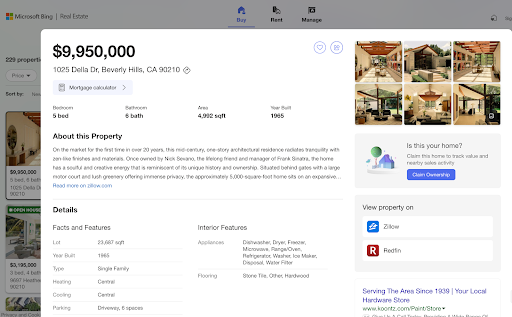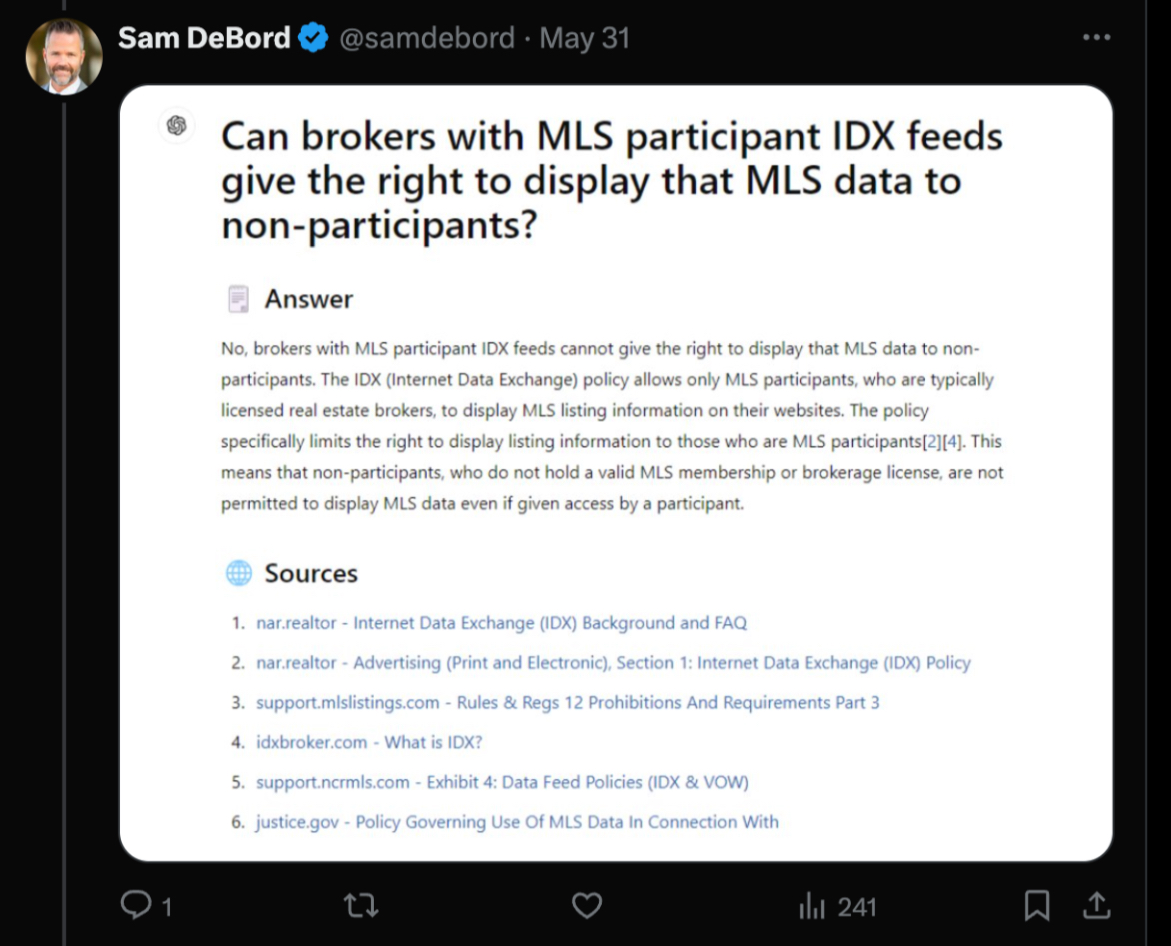The real estate industry X tribe (aka twitter) has been keeping a sharp eye on Microsoft Real Estate and other search sites for a long time. Like Google, Facebook, Yahoo and so many others, real estate advertising sits alongside automotive as a multi-billion dollar opportunity for advertising revenue. The only thing in the way is the data license structure for MLS data, the fragmentation of MLS data across over 500 areas, and copyright laws protections. Do a property search on https://www.bing.com/homes – look what happens.
Surely, the last thing that any MLS wants to do today is pick a fight with Microsoft, Zillow, and Redfin. However, sending a cease and desist letter is exactly what they are obligated to do. And, if the MLS listings are not immediately and permanently removed from Microsoft Bing and any affiliated company databases and AI programs – The MLS will need to shut off data feeds just as they would with any other broker found to be in violation.
Here is a screenshot of the violation on Microsoft Bing –

This is a nice home in Beverly Hills. The data violations on this property display numerous. The data is not permitted to be displayed on a non-participant broker website (bing is not a member broker of the MLS). The listing broker (and listing agent in many markets) must be displayed on the listing which is not displayed here at all. Brokers like Redfin (and paper brokers like Zillow) are prohibited from providing listing data to third parties and Redfin and Zillow are clearly making listing data available to Bing. One exception is that the listing broker and agent have very broad latitude in advertising their listings and distributing their listings – but not those of another broker participant. All listing displays are required to publish the MLS copyright statements (or link to them where there is a limited display). Notice how Bing, Zillow, and even Redfin have cropped or partially cropped the images to remove the TheMLS watermark? This is intentional. Take a look at the same listing on Homes.com – they do not crop the images and are much better custodians of the property data than Zillow or Redfin – https://www.homes.com/property/2630-hutton-dr-beverly-hills-ca/qdew8pmlxbn5q/
Redfin and Zillow are apparent actors in the Bing scheme
Zillow, Redfin and Microsoft announced a partnership in 2023 https://blogs.bing.com/search/may_2023/Bing-at-Microsoft-Build-2023
Quotes from Microsoft article –
“As part of this shared plugin platform, Bing is adding to its support for plugins. In addition to previously announced plugins for OpenTable and Wolfram Alpha, today we’re thrilled to welcome Expedia, Instacart, Kayak, Klarna, Redfin, TripAdvisor, and Zillow to the Bing ecosystem. With plugins built right into chat, across desktop and mobile, Bing makes relevant recommendations based on your conversation”
“With Redfin, you will be able to describe your ideal home in everyday terms and Bing Chat will find listings that suit your needs, saving you from searching through endless listings.”
“With Zillow, you’ll have a built-in real estate expert giving your Bing search a boost with additional housing and market information.”

It seems like Zillow and Redfin started a relationship with Microsoft to leverage innovative OpenAI technology to deliver some interesting consumer benefits to people searching for homes on Zillow and Redfin. It is hard to ascertain how this relationship started with Bing Chat and evolved into Bing.com/realestate providing a full listing display breaking so many MLS rules, that links out to advertisers, and points to Zillow and Redfin as the sources of the data rather than the brokerage or MLS. It’s not Zillow or Redfin’s data to give!
Clearly, MLSs will need to reach out to their broker participants – Zillow and Redfin to inquire about the nature of the relationship between them and Microsoft. If Microsoft is taking the listing content without permission from Zillow and Redfin, the MLSs will need to go after Microsoft as they would if a third party was taking data from any other participant website. If Zillow and Redfin were complicit in the scheme to display data on Bing.com, then the MLS will need to ask them to stop immediately or have their data feed shut off.

This is a declaration of war
Many forward looking MLSs saw this future a decade ago and created an MLS owned organization called Red Plan. Red Plan contributed to the development of the data license agreement template provided by NAR to its member MLSs, development of a real estate forms repository for copyright maintenance, but most of all, a legal defense fund to protect nefarious actors like Bing from using and profiting off of data that does not belong to them. In April of 2016, Red Plan contributed its assets and legal defense fund to the Council of MLS. The legal defense fund would not have been adequate to pursue a case against Microsoft in 2016, but I believe that if contributions would have continued and more MLSs would have participated, it would have been good enough today – a decade since Red Plan was aborted. Hindsight is 20/20. I cannot help but to imagine that the National Association of REALTORS could rebuild some good faith with their members if they step up and take action by helping MLSs to protect the broker’s data assets.
One way or another, each and every MLS in America has a duty to its brokers to stop Bing from displaying these listings. What I have learned from excellent sessions at the Council of MLS on Copyright and Data Licensing, from reading the book by attorneys Larson/Skinner – Real Estate Listings and Copyright, and from my experience as an expert witness in VHT vs Zillow is that copyright enforcement is really hard. In the VHT case, the US Court of Appeals for the Ninth Circuit concluded that real estate marketplace Zillow did not directly infringe photos from VHT by hosting those photos and making them available to others, but Zillow’s tagging and cataloging of other photos to provide search capabilities did constitute direct infringement and was not transformative fair use. I believe that the latter part of the 9th circuit’s ruling about “not transformative fair use,” is at play here as the listing display on Bing is definitely not transformative fair use.
MLSs face and existential inflection point
In August, the offer of compensation will be removed from our nations’ MLS systems. That will eliminate a key value proposition of shared commission. Remaining value will be around cooperation, specifically in the compilation and dissemination of uniform property information that is used by brokers to price and market homes for sale, and by appraisers for valuation purposes.
The MLS is a neutral third party that allows for brokerage cooperation to work effectively. It provides a system of mutually accepted rules, and regulates those rules to the benefit of all concerned. The property data set is invaluable for buyer and seller CMAs and home search.
Let’s imagine that OpenAI can collect every bit of property information ever published, combine it with public record data, organize it and make it available to any broker, appraiser, or consumer. Actually, we do not need to imagine it. OpenAI does collect all real estate property information today. The only missing ingredient is that OpenAI does not have the data licensing rights or permissions to the data.
Brokers join the MLS to participate in a bargain whereby each broker contributes their proprietary listing content to gain exclusive reciprocal access to the proprietary listings of other broker participants. If brokers are the only ones playing by the rules, and being limited with their use of property data, why belong to the MLS and pay for the opportunity to have their data usage oppressed?
MLS must protect the assets contributed by each broker, or firms will simply contribute their content to OpenAI for free, and access the listing content of other brokerage firms using OpenAI. CMA vendors like Inside Real Estate, Delta Media and dozens of others can stop paying $5 Million a year in Data License fees and access the data from OpenAI. An OpenAi driven CMA would work like CloudCMAs revolutionary 1 Minute CMA, only it would be almost instant. Moreover, consumers could simply run their own CMA without a professional.
This may be a make or break moment for MLS. If they do nothing, the result may be the creation of a slow migration pattern of non-participation as tech firms recognize that OpenAI can provide them the data they need to serve their broker clients without the MLS. Data consumers like mortgage brokers and bankers can just as easily get the information they need for free too.
Zillow and Redfin can easily stop Bing
Here is how easily Zillow and Redfin can stop bing from accessing and republishing content – code courtesy of OpenAI “<meta name=”robots” content=”noindex”>.” Inventory is turning in 30-90 days in most markets, rendering search on Bing irrelevant in a short period of time. If current listings are not displayed to active home buyers in today’s tight market, consumers will abandon them. Of course, this would be a poison pill for Zillow and Redfin who rely on search engines for a significant amount of their consumer traffic.
Meanwhile, MLSs can pursue legal remedies. If Zillow and Redfin refuse to cooperate with each MLS to remedy the problem, then they are in violation of the broker participation agreement and their data access can be immediately terminated. If Zillow and Redfin are upset about it, they can take legal action against Microsoft for lost income.
More Coverage
One of my favorite industry journalists is Marian McPherson at Inman News. She is covering this story and wrote a fantastic piece. Click on the image above if you want to see her thoughts in her very well written article.





